#wilhelm in a nutshell
Explore tagged Tumblr posts
Text
Simon has passions, hobbies, and interests. Wilhelm has Simon.
I said what I said.
#young royals#young royals s3#edvin ryding#omar rudberg#simon eriksson#prince wilhelm#spilled ink#funny#writers on tumblr#incorrect young royals#young royals wilmon#wilmon#wilmon endgame#ao3 fanfic#thoughts#quotes#true quotes#wille x simon#tv series#netflix#simon yr#wilhelm yr#simon x wilhelm#dark academia#writeblr#boy love#romantic quotes#this is so true#wilhelm in a nutshell#Wilhelm loves Simon so much
147 notes
·
View notes
Text
After reading yet another completely misinforming post on Saturn, filled with pointless negativity and lack of understanding, I feel like I need to set the story straight.
To understand Saturn, one needs to know its natural zodiacal place, which is after Jupiter. So Saturn is a natural consequence of Jupiter. This is where Vedic astrology is helpful, because we get the understanding of the planets from the Nakshatra order, which translates to all aspects of life.
If you want to understand Jupiter’s nature in a nutshell, I always think of Luc Besson’s “Lucy”, where by the end of the movie, we witness achievement of infinite consciousness. “I am everywhere” is Jupiter’s motto. It is constant growth and expansion, because Jupiter reflects the Divine nature of the Universe, everything being a part of a constant expansive plan. And we need that in our lives, because it keeps us going, the awareness that there is more to do, to create, to develop, always. That’s why Jupiter represents hope and perspective and can lead to success, because this is where we have the most energy to “spread”, the most will to continue constantly expanding and creating, which keeps us going and shows us the light at the end of the tunnel even in most difficult situations.
However, with all the positive aspects of Jupiter, over time we run into several issues. The first one is that constant growth also leads to danger of excess. If bushes grow and we don’t trim them, they become a mess. Everything that is not tended to, eventually decays without maintenance. And that next step, building on Jupiter’s expansion, is Saturn. The second one is energetic exhaustion, because any non abstract matter needs to reset cyclically to keep going. This also comes with the realization that if you are everywhere, you become a target for everyone, which is tiring too. Jupiter is a purely abstract planet, so it doesn’t understand that physical responsibility, but that realistic, necessary need for privacy, rest and break is Saturn. The last problem we run into is lack of focus. If we are everything and everywhere, we can also feel void, nothingness, because such is the duality of God and the Universe and with infinity there is no direction, so precise building becomes an issue. That organization, that narrowing down, that makes building and focusing possible is Saturn. That is also why Saturn is friend’s with Venus, the planet of decisions, because to make a decision you have to let go of something to prioritize over something else, and Saturn gives Venus that efficiency.
As you can see, fundamentally none of these traits of Saturn are bad or negative and all of them are essential. For instance, you can’t build a successful business without organization and compartmentalization, without being able to discard the unnecessary and control and cultivate your object of focus. If you struggle with any of the above processes in your chart, your Saturn is struggling by aspect, sign or dignity and it simply resists at performing a necessary job that it was meant to do. So any negative experiences with Saturn are simply what we can equate to a malfunctioning machine.
The collective fear mongering towards Saturn comes also from these malfunctions and also because other more impulsive, spontaneous planets don’t agree with its nature. Ernst Wilhelm says in his teachings that Saturn has so many enemies (Sun, Moon, Mars), and for that reason it’s easy to misunderstand it.
To give you an example, don’t believe any of the posts that say Saturn in the 2nd house will make you poor. It only will, if you make bad decisions with it, because every bad action in this life has a consequence. To contrast it, while an unafflicted Jupiter in the 2nd would have the karma of a certain level of basic financial freedom and certain creative financial intelligence “what can I buy and keep buying that will make my life better?”, Saturn in the 2nd would more enter the stage of “buying endlessly with no purpose is exhausting and wasteful, what can I buy and how can I invest in a way that yields long term dividends? How can I cut off excess to redirect these resources in a more useful way? Do I really need that much, or can I put certain resources towards something more worthy?”. So the theme here is responsibility for an allocation of every penny, not deprivation.
Saturn will perform on a similar principle in all houses, and that becomes really important when Saturn is a Karaka of a certain house, like in the 10th house, because some things cannot be achieved without focus. For instance, even if you do have a multitude of hobbies and several interests or even professions, you only have so much time each day, so narrowing down your options and choosing what is truly important becomes imperative, and that commitment of what you devote your time and energy to, that narrowing down and prioritizing of one avenue over another, is what over time becomes what we in the modern world call a career. If your life is scattered, you will never accomplish anything, even if your dreams were humble, and you will find yourself on your deathbed with no lasting legacy.
#astrology#vedic astrology#jyotish#astrology asks#astro observations#astro notes#vedic astro observations#vedic astro notes#saturn#jupiter
121 notes
·
View notes
Note
Hello! I hope that you are doing well!
I just wanted to send you a question regarding the amount of power Rhea has in Fódlan since something came to my mind. You know how during Edelgard's coronation, she said to her father that, "The Archbishop of the Church of Seiros would normally act as witness, but my professor will fill that role instead"?
Unless I missed something [or am overthinking], do you believe that Rhea was even there to witness Ionius' coronation?
We were told in the game that it had been ages since a member of House Hresvelg enrolled into the Officers Academy as well as that there had recently been a rift between the Adrestian Empire and the Church of Seiros.
Therefore, to me at least, that implied that said rift had been going on for a while. And I do not see why they would allow her there if such a thing was going on. Yet, Rhea does not retaliate against this as far as I know. Then there is the fact that Edelgard is allowed to be coronated without Byleth's presence. The Southern Church was dismantled, too, so…I think it is safe to say that there was not an official to witness her from there as well. lol
To put it simply, it feels very contradictory to me and adds a crack into the "Rhea controls Fódlan" perspective.
Hi!
I agree, that NPC going all "the empire and hthe church cut ties eons agao that's why supreme leader is the first imperial heir to attend since ages" suggests Rhea wasn't very welcomed in Enbarr.
FWIW the Nopes book about the Southern Church incident reveals the Emperor of that time already wanted to cut ties with the Central Church - and used this rebellion (which was more or less a Varley daughter wanting to have a role instead of letting her bother inherit everything?) as an excuse to finally give them the boot.
In a nutshell, I heavily doubt Rhea was around when Ionius was coronated, if her Church was already "not welcomed" by the time the Southern Church was disbanded.
The Archbishop acting as witness might be just some sort of old ceremonial thing, just like the "covenant of the red blood and the white sword", maybe all coronations try to renact the "oath" Wilhelm took/swore to Seiros when she presumably made him Emperor of Adrestia? And the Archbishop acts as a stand in for Seiros (even if we know better!) when the oath is sworn again by Willy's descendants?
As you pointed out, the Archbishop being present or not is merely decorum, since nowhere the game suggests that in the non-CF routes, Supreme Leader's coup coronation isn't regular or anything.
Rhea controlling Fodlan isn't backed up by canon, Adrestia has been doing its own thing for several centuries, the CoS only provides help (the game doesn't tell us what it is!) to Faerghus : Dimitri becomes King not because Rhea crowns or splashes oil on him, but because he is the Crown Prince and the last heir of the previous King. As for the Alliance, it does its own thing without her input!
#dovehearts-blog#replies#FE16#Rhea/the CoS controls Fodlan is a take sponsorised by NoA and Treehouse#even in the european websites we didn't get that shit to describe Fodlan#on that regard we're closer to the jp description of the continent than to the US one for once#I'd say Rhea has a complicated relationship with Adrestian Emperors#she can't help but be disappointed because they're not Wilhelm and will never equal him#only he has the 'great' title lol#and they don't follow the CoS and its principles like remember when they tried to invade Brigid/Dagda? Or fed northeners to beasts for fun?#and yet they're the scions of Wilhelm so maybe she can call them her allies? If she needs help they will provide? (we know how it ends lol)#in the half lizard lycaon AU she has even more conflicted feelings bcs#those people aren't willy nor lycaon when it was him who was supposed to be there#everytime she witnesses a new coronation she remembers this coronation happens#because her kid was torn apart by the very people she's crowning#children aren't their parents she knows it and yet there's still that small heartache#bcs Ionius 1 to Ionius 9 aren't Lycaon#back to canon i guess the CoS's presence in Adrestia is mostly ceremonial#to replay the willy'n'seiros alliance#but nothing as important as if Rhea says tut-tut the Emperor cannot be crowned#rhea stuff
17 notes
·
View notes
Text
08.30, 08.31, 09.01, 09.02, 09.03 & 09.04.24
Kinda screwed the pooch on keeping current with the blogging over the past several days. The important stuff to know on the creative front: I settled on a version of theme which combines the advice from Craig Mazin's aforementioned Scriptnotes essay with guidance from his co-podcaster, famed screenwriter John August, who thinks of theme more in terms of a core idea or "DNA" that infuses every scene and character -- the essence which gives a film its distinctiveness. I made a change to the Set-Up Want section of the Nutshell worksheet to align with my theme (all the other sections stayed the same), so now I'm on to attempting that rudimentary version of the Beat Board. My goal is to have it filled in by this time next week and then finally grind out my first draft.
I now have a meme pinned to my corkboard, a photo of Jordan Peele along with his sage quote, "When I'm writing the first draft I'm constantly reminding myself that I'm simply shoveling sand into a box so that later I can build castles." I hope to muster the discipline to abide by this credo.
Monday's screening of Spaghetti Western at the Studio City Film Festival went well. Frustratingly, Leti missed it due to a camera crew blocking the entrance of the theater when the program started (our short was first in the lineup), but hopefully she'll have another opportunity to see it projected. She would've been happy with the audience's response to the Wilhelm scream gag. Afterward, we gathered at Brews Brothers down the street and hung out with our crew and friends for about three hours. I had made a reservation at the wrong location (BB has another one in Burbank); luckily, there was plenty of room for us anyway. Abby brought Erica, which made me very happy; and though Manny made it to the screening, she was unfortunately unable to stay and socialize.
This week may be the hottest of the year thus far. It's hard to keep the office temperature comfortable, and the heat may be activating the constant itchiness on my back -- not ideal conditions for writing, but I can't let that stop me.
0 notes
Text
Even further thoughts but a friend brought up how a number of her haters could be coming from a place of misogynist thinking, and that if she were a man, it would be thought of as an epic tale of revenge. I agree, but I also think a great majority of Rhea’s haters just misunderstand her and in some cases even go to great lengths to misinterpret her character. I won’t be coy, yes she lied. I’m not going to argue against this, but I think it came from a place of love as well as the self preservation instinct. Who wouldn’t want to not be murdered for your special blood that grants super powers?
As for it coming from a place of love, we see how she acts towards others in the game: gentle, maternal, the likes. She’s a leader that with Wilhelm, rallied an army to fight off Nemesis. She’s thrust responsibility upon herself (I don’t believe she has any political power in the three countries and I don’t believe she’s controlling anything other than the central church) that weighs very heavily on her. Her counseling box questions show wants to be able to take walks without people surrounding her to protect her, and she wants to go to the dining hall and interact with church goers, students, commoners… but worries she might come off too intimidating. Her and Edelgard are much the same in this regard: she’s a sad, lonely girl that really just wants connection and to be heard. And like it or not, she deserves to be heard.
The game in general has too much conflicting information about the church. I don’t think it’s an institution without merit and it helps countless people. Reforms are needed, yes, but it’s not like that can’t come about while she’s serving Archbishop, they obviously happen in endings where she lives and even continues to serve as archbishop if married by Byleth. I think, in general, Three Houses does Rhea a HUGE disservice and I believe Silver Snow should’ve been much different: Rhea should’ve remained uncaptured, and functioned as the “lord” of that route, and it should’ve ended with Rhea donning her persona of Seiros once more (or going back to being called Seiros as she was originally, another thing the game isn’t clear on) and having a climactic final battle rematch with reanimated Nemesis. It’s crazy Rhea doesn’t even get to see Nemesis again in VW!
Anyway, that’s my thoughts in a nutshell. I’d like to hear other people’s perspectives but I really don’t want to hear people hating on her, please
I think it’s really really depressing five years out discourse hasn’t changed around three houses and I think most disappointing of all is how some people still have this vitriolic hatred of Rhea and think she deserves to be murdered. I’m sorry but that’s like a really really odd line of thinking and it reflects poorly on you to put that out there idk
#Rhea fire emblem#Seiros fire emblem#three houses#fire emblem three houses#fe3h#feth#fire emblem discourse#three houses discourse#sorry for wall of text I love Rhea and have so many thoughts on her I’d love to talk about
22 notes
·
View notes
Text
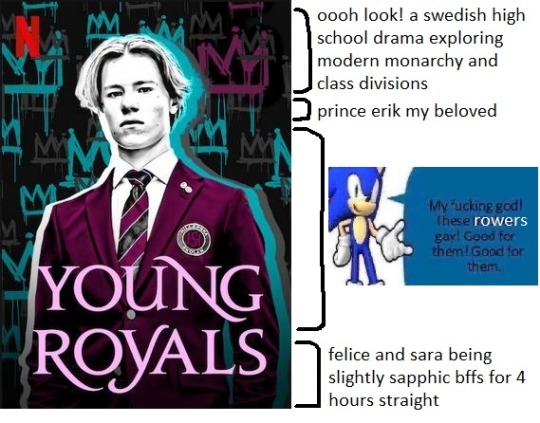
young royals in a nutshell
#young royals#young royals spoilers#young royals netflix#prince erik#felice#sara#wilhelm x simon#simon x wilhelm#netflix#eric should have had more space but blame the writers for it#yes this is the 2nd nutshell thingy i made so what
832 notes
·
View notes
Text
wilhelm, arriving at hillerska: i hate it here. i fuckin hate it here. fuck my parents. fuck these snobs. erik, bro, please get me out of here
simon: /sings
simon: eat the goddamn rich
wilhelm: ok. this is my new home
#in a nutshell#wilhelm is my son n i will die for him#young royals#netflix young royals#ignore me!#mine#rambles#wilhelm x simon
481 notes
·
View notes
Text
ONE MORE THING regarding late 19th Century Anglo-German relations... Okay. It's a little paternalistic but I imagine each European nation gets a bit touchy when it comes to these poor girls being plopped in a place they aren't prepared well enough for being asked to carry out diplomacy at a time when personal politics don't matter as much anymore. And I think Victoria's eldest daughter Vicky, the mother of Kaiser Wilhelm II, kind of shows this phenomena in a nutshell.
Also I do imagine that Arthur would be incredibly uncomfortable with how Princess Vicky was treated by the Prussians (then Germans) which would really colour his interactions with Gilbert and Ludwig in the second half of the 19th Century. It's a narrow scope example of why relations between the two just crumble so badly by the 1880s on.
Bear with me. I have a point.
Okay so, Queen Victoria's girls were very much trained for politics. Prince Albert was like here have all the philosophy and theory you could ever need. So Vicky, Alice, Louise, Helena and Beatrice all would be ready to be good Queens. Or, at least, trained to be good British Queens, which doesn't really fly in the German states. Especially for eldest daughter Vicky.
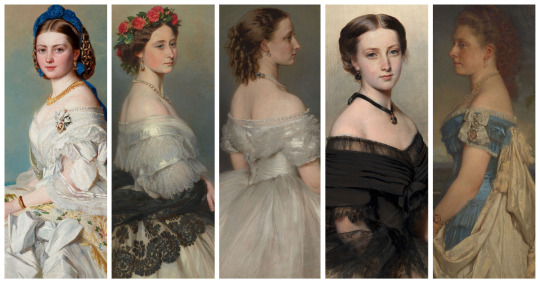
Sidenote: They all have chubby cheeks and I want to squeeze them.
So you have a Princess who yes has a nice like-minded husband, but her in-laws dislike her, and her eldest son rebels against his liberal mum by going full on authoritarian and creates a rival court so extensive that by the time she becomes German Empress this other faction frequently raids her home for anything that would excuse her exile or worse... you know. Typical royal family stuff.
But she is also a woman who reads and supports Karl Marx (what the...) and Charles Darwin, builds hospitals during the Franco-Prussian war, founds girls schools and nursing colleges, visits Synagogues, openly calls antisemites lunatics, encourages a free press... and the German court hate her for it. Largely because she refuses to be quiet.

So it's not just a case of 'the mean Germans think my perfect Princess is annoying' for Arthur; it's that conflict between Liberalism and Conservatism which is the very crux of why Germany and England are incapable of having friendly relations. Arthur watches the soft power and these (somewhat bullshit/hypocritical) liberal ideas and principles he has set himself up as representing on the international stage get completely and utterly rejected by another nation. One that he cannot exert control over. And I bet that infuriated him. His way absolutely is the right way what is Ludwig's damage you know? And I guess after WWI he feels mighty vindicated but until then... what a frustration.
Arthur and Ludwig (or Gilbert, depending on how you interpret who's actually in charge at this time) have such very different ideas on power and ruling and what a monarch is even there to do. It's just a very personalised example of why Arthur cannot get along with Ludwig. A British Princess (friendship) was a very precious thing to have, and the Germans squandered her (it). At least in Arthur's eyes.
#no-one cares but my fave princess was Louise#her life is like:#excel at carpentry & sculpture do a mean sword dance marry a maybe gay Scot & not a prince go to Canada host a party in Ottawa#start a fire at the party make rich people uncomfortable in Ottawa by making them talk to grocers catch a 13kg fish in front of dad-in-law#get a concussion from a sleigh accident have Alberta named after you support Irish Home Rule support suffragists#offer to do a Bermudian lady's ironing for her whilst she gets you water because you decided to walk to a party instead of drive die at 91#what a gal#...anyway#hetalia#headcanon#hws england#hws germany#hws prussia#historical hetalia#op
30 notes
·
View notes
Text
season 1 in a nutshell
"oh wilhelm...you poor, poor soul"
31 notes
·
View notes
Text
[Sledujte] The Marksman Celý Film česky "CZ online 2021
Když se Jerry přestěhuje do luxusního hotelu na Manhattanu, kde právě probíhá svatba století, její zoufalá organizátorka si najme Toma, aby jí pomohl se myšáka zbavit. Hon kocoura a myši vzápětí skoro zničí nejen její kariéru a chystanou svatbu, ale i skoro celý hotel.

Sledujte : : - https://t.co/3FVTEdPgLF?amp=1?M4rksmancz
Žánr: Akční, Thriller, Krimi Hvězdy: Liam Neeson, Katheryn Winnick, Teresa Ruiz, Juan Pablo Raba, Dylan Kenin Režisér: Robert Lorenz, Robert Lorenz, Francisco X. Pérez, Wilhelm Pfau, Mark Williams
The Marksman premiéra, The Marksman online cz, The Marksman online cz dabing, The Marksman Zadarmo, The Marksman Celý Film, The Marksman Titulky, The Marksman nový film, The Marksman DVD filmy, The Marksman Blu-ray filmy, The Marksman 3D filmy, The Marksman online bombuj, The Marksman online cely film CZ, The Marksman online ke shlednuti, The Marksman cz dabing online ke shlednuti, The Marksman online, The Marksman online film cz, The Marksman Bombuj, The Marksman bombuj cz, The Marksman online ke shlédnutí, The Marksman celý film Cesky, The Marksman celý film zdarma ke shlédnutí, The Marksman celý film cz dabing, The Marksman zkouknito, The Marksman sleduj filmy, The Marksman online cz titulky, The Marksman celý film
In 1889, on November 1 in Gotha, Germany Anna Therese Johanne Hoch, who later would be known as Hannah Hoch was born. Being the eldest of five children, the girl was brought up in a comfortable and quiet environment of the small town. Her parents, a supervisor in an insurance company and an amateur painter sent her to Girl’s High school. However, at the age of 15 Hannah had to quit studying for the long six years to take care of her newborn sister. Only in 1912 she continued her education with Harold Bengen in School of Applied Arts, mastering glass design. As the World War I broke up Hannah returned to the native town to work in the Red Cross. The first years after war the young woman recommenced her studying, getting to know graphic arts. 1915 was highlighted by an acquaintance with an Austrian artist Raoul Hausmann, which grew into the long-lasting romantic relationship and involvement in Berlin Dada movement. For ten years till 1926 Hoch worked in Berlin’s major publisher of newspapers and magazines. Her task was to design embroidering, knitting and crocheting patterns for the booklets. Being on vacation with her beloved in 1918, Hannah discovered ‘the principle of photomontage in cut-and-paste images that soldiers sent to their families’ (National gallery of Art). This find affected greatly on her artistic production, and she created mass-media photographs comprising the elements of photomontage and handwork patterns, thus combining traditional and modern culture. Her prior preoccupation was to represent the ‘new woman’ of the Weimar Republic with new social role and given freedoms. Hoch was the only woman in Berlin Dada, who took part in all kinds of events and exhibitions showcasing her socially critical works of art. Till 1931 she participated in exhibitions but with the rise of National Social regime was forbidden to present her creative work. Till her last breath in 1978 Hannah Hoch lived and worked in the outskirts of Berlin-Heiligensee. The piece of art which is going to be analyzed in this research is ‘The beautiful girl’ designed in 1919–1920. It combines the elements of technology and females. In the middle of the picture one can clearly see a woman dressed in a modern bathing suit with a light bulb on her head which probably serves as a sun umbrella. In the background a large advertisement with a woman’s hair-do on top is presented. Maud Lavin describes strange human as ‘she is part human, part machine, part commodity’ (Lavin). The woman is surrounded by the images of industrialization as tires, gears, signals and BMW logos. A woman’s profile with the cat eyes, untrusting and skeptical, in the upper right corner is eye-catching as well. This unusually large eye symbolizes DADA movement — a monocle, which is present in almost every Hoch’s work. The colour scheme does not offer rich palette of tints, including mostly black, white, orange and red pieces. The photo is surrounded by the BMW circles which add the spots of blue. An apt description of the piece is given in the book ‘Cut with the Kitchen Knife’ and states that it is ‘a portrait of a modern woman defined by signs of femininity, technology, media and advertising’ (Lavin). In other words Hannah Hoch focused on the woman of the new age, free and keeping up with the fast-moving world. The artist promoted feministic ideas and from her point of view urbanization and modern technologies were meant to give hope to woman to gain equality of genders. With this photomontage she commented on how the woman was expected to combine the role of a wife and mother with the role of a worker in the industrialized world. The light bulb instead of a face shows that women were perceived as unthinking machines which do not question their position and can be turned on or off at any time at man’s will. But at the same time they were to remain attractive to satisfy men’s needs. The watch is viewed as the representation of how quickly women are to adapt to the changes. In a nutshell, Hoch concentrated on two opposite visions of the modern woman: the one from the television screens — smoking, working, wearing sexy clothes, voting and the real one who remained being a housewife. The beautiful girl’ is an example of the art within the DADA movement. An artistic and literal current began in 1916 as the reaction to World War I and spread throughout Northern America and Europe. Every single convention was challenged and bourgeois society was scandalized. The Dadaists stated that over-valuing conformity, classism and nationalism among modern cultures led to horrors of the World War I. In other words, they rejected logic and reason and turned to irrationality, chaos and nonsense. The first DADA international Fair was organized in Berlin in 1920 exposing a shocking discontentment with military and German nationalism (Dada. A five minute history). Hannah Hoch was introduced to the world of DADA by Raoul Hausman who together with Kurt Schwitters, Piet Mondrian and Hans Richter was one of the influential artists in the movement. Hoch became the only German woman who referred to DADA. She managed to follow the general Dadaist aesthetic, but at the same time she surely and steadily incorporated a feminist philosophy. Her aim was to submit female equality within the canvass of other DADA’s conceptions. Though Hannah Hoch officially was a member of the movement, she never became the true one, because men saw her only as ‘a charming and gifted amateur artist’ (Lavin). Hans Richter, an unofficial spokesperson shared his opinion about the only woman in their community in the following words: ‘the girl who produced sandwiches, beer and coffee on a limited budget’ forgetting that she was among the few members with stable income. In spite of the gender oppressions, Hannah’s desire to convey her idea was never weakened. Difficulties only strengthened her and made her an outstanding artist. A note with these return words was found among her possessions: ‘None of these men were satisfied with just an ordinary woman. But neither were they included to abandon the (conventional) male/masculine morality toward the woman. Enlightened by Freud, in protest against the older generation. . . they all desired this ‘New Woman’ and her groundbreaking will to freedom. But — they more or less brutally rejected the notion that they, too, had to adopt new attitudes. . . This led to these truly Strinbergian dramas that typified the private lives of these men’ (Maloney). Hoch’s technique was characterized by fusing male and female parts of the body or bodies of females from different epochs — a ‘traditional’ woman and ‘modern’, liberated and free of sexual stereotypes one. What’s more, combining male and female parts, the female ones were always more distinctive and vibrant, while the male ones took their place in the background. Hannah created unique works of art experimenting with paintings, collages, graphic and photography. Her women were made from bits and pieces from dolls, mannequins of brides or children as these members of the society were not considered as valuable. Today Hannah Hoch is most associated with her famous photomontage ‘Cut with the kitchen knife DADA through the last Weimer Beer-Belly Cultural epoch of Germany’ (1919–1920). This piece of art highlights social confusion during the era of Weimar Republic, oppositionists and government radicals (Grabner). In spite of never being truly accepted by the rest of her society, this woman with a quiet voice managed to speak out loud her feministic message. Looking at Hannah Hoch’s art for the first time I found it confusing, because couldn’t comprehend the meaning. It was quite obvious that every single piece and structure is a symbol of the era, its ideas and beliefs. However, after having learned about her life and constant endeavors to declare about female’s right, little by little I started to realize what’s what. As an object for research I chose ‘The beautiful girl’ as, to my mind, its theme and message intersects with the modern tendency: a successful, clever, beautiful and free woman has to become one in no time, cause the world is moving faster and faster. I enjoyed working with this artist as her example is inspiring and is worth following
1 note
·
View note
Text
Good Luck Out There (Wilhelm)
I.
The sun hung low over the steeples and chimneys of Aelfheim, the sky a brilliant tapestry of pink and gold and deep blue at the corners. On the still-warm tile of the manor’s roof, Aviva pushed herself up to sitting, pulling the leather cord from her hair and letting the long braid slowly release itself. It had been some time since she had enjoyed a rooftop sunset.
“I think I’m going to build a tower,” Wil offered, apropos of nothing.
“A tower?” Aviva considered that for a moment. “Like your father’s?”
Wil chuckled humourlessly, reaching for the half-empty bottle of wine sitting between them. “No-one could build a tower quite like my father’s. His was connected to dark energies I couldn’t even begin to work with. I’m honestly not even sure those energies exist in the world now, given how we remade things.” A pause. “Plus, nobody’s that extra,” he added, taking a large gulp of wine to punctuate his point.
Aviva snorted. “That’s certainly true.” She accepted the offered bottle, taking a considerably smaller sip as she thought. “Where would you build it?”
“I’ve been thinking about that.” Wil’s tone was casual, as if discussing the weather. “So far, my first choice is out in the Blacksand Desert. Less of a chance I’ll be interrupted.”
“Yes, can’t have innocent bystanders walking in on your weirdness,” Aviva teased, but the truth of it nagged at her. Wil had become less and less social over the years since they had restored the world. Though always willing to visit with Aviva and her immediate family, he had withdrawn almost completely from public life, politely declining any official invitations and avoiding what he considered “prying eyes”. She passed the bottle back to him, her smile fading. “If you could still access those energies, would you?”
Wil kept his gaze focused on the vanishing sun, putting the bottle to his lips in a convenient moment of silence. “I don’t know. Alphinaud wasn’t my stone’s guardian, so I suspect it’s a moot point. But I’m starting to wonder if we might have greater access to our own elemental powers. I’m Shadow, after all; there’s probably a lot I could do. I could certainly make one hell of a tower.”
“You could, at that.” As the last of the sun melted into the horizon, a cold breeze whipped across the roof, tugging at Aviva’s hair and making her shiver. “Let’s head inside,” she suggested. “We can find Halei, or we can go out into the city and get into trouble.”
Taking another swig of wine, Wil nodded. “Let’s go find your wife. I’m all for staying in, though. Last time Sol and I went out in this nice city together, we started a bar fight.”
Aviva huffed a soft laugh. “I’m sure they’ve forgiven you since then.”
“I’m not gonna take any chances.”
II.
“Wil?” Aviva called as the dimly-lit antechamber of the tower materialised around her. “You called? I came as quickly as I could. Wil?”
“Hey, V.” Wil leaned against the doorframe, his sleepless face pulled into a wry half-smile. “Thanks for coming. I, uh… I guess I wanted to… talk? To someone?”
“Of course.” Aviva offered him her most reassuring smile. “What’s up?”
For a few moments, Wil fiddled uncomfortably with the wide sleeves of his robe, unable to meet her eyes. Then, finally: “My mum died.”
The Tiefling’s shoulders sank. “Oh, Wil…” With one fluid step, she crossed the antechamber and spread her arms, wrapping Wil in a tight hug. The Half-Elf stiffened, then changed his mind and softened into the embrace. It had been some time since he had touched anyone. When they finally separated, Aviva held him gently by the shoulders. “What happened?”
“Oh, heart failure. Human old age. Not unexpected.” He reconsidered his statement. “Well, not by her doctors. It wasn’t something I’d really thought about in… a long time.”
Aviva nodded. “Did you ever go see her again?”
“Absolutely not,” Wil answered sharply, taking an almost involuntary step backward into the tower’s main hall as he slipped free of Aviva’s hands. “I understood her words.”
With a twist of her stomach, Aviva realised she did not have anything to say to that. She had never understood Evangelina Stonewood’s instructions that, for both her safety and his, her son should never return. After the defeat of his father and the restoration of the world, Aviva had expected mother and son to reunite, sooner or later. The thought of sending her own daughter away, even to guarantee her safety, brought a tightness to her throat. “How did you find out?”
“Dr. Unne.” Wil’s old mentor. “He’s out the door soon himself, but I still keep in contact with him from time to time.” With a deep sigh, Wil turned and began to descend a rounded flight of stone steps, gesturing for Aviva to follow. “You want some coffee?”
“Yeah.” The bottom of the steps opened into a surprisingly homey kitchen, the fireplace burning cheerily even as it cast deep shadows about the room. The skeletons going about their chores had long since ceased to surprise Aviva, and she accepted a steaming mug from what had likely once been a goblin with a nod of thanks. “Got any bourbon to put in it?”
Wil clucked his tongue. “Of course. What kind of man do you take me for?”
Settling at the small kitchen table, they sat in silence for a while. The quiet seemed to comfort Wil, as did the presence of his Tiefling friend. Eventually, he spoke again. “I’m not going to die.”
“Pardon?”
“I’m not going to die,” he repeated. “I’ve been studying my father’s old papers. He was foolish, turning to the path of the vampire. But there are other ways, ones that are less damaging to the mind. I haven’t figured out the best one yet, but… I’m on my way.”
Aviva chewed her lip. “Wil… Following in your father’s footsteps. You saw what he became. Corrupted, mad. Are you sure that’s a good idea? How do you know you’ll avoid the same pitfalls?”
“Because I have all his failures to build on.” Wil swirled the dark liquid in his mug. “I have a map of his mistakes. I know how to avoid them.”
“There are nearly infinite mistakes when it comes to magic of this magnitude--”
“I was in a guy’s head when he died, Aviva. I felt what it was like.” Wil looked her in the eye. “I’m not going to do that again.”
For a time, neither spoke. Then Aviva sighed. “Just be careful, okay?”
Wil scoffed, smoothing the folds of his robe with pointed overconfidence. “When am I not?”
III.
“Aviva?” Halei called from the doorway to their quarters. “V? You’re… You’re going to need to see this.”
“Yes, sunshine?” Aviva poked her head into the sitting room, her fingers tangled in the hair she was attempting to sweep into an elaborate updo. The sight of Halei stopped her cold. “Are those… bones?”
Halei stepped inside, pushing the door closed with her foot. “Yes,” she said simply, making her way carefully around the sofa and depositing an astonishingly large collection of sun-bleached bones onto the table. “It showed up at the front gate and apparently spooked the guards, so they took it down.”
Hesitantly, Aviva approached, freeing her hands and letting her hair tumble down her back. “Alright… So… Why is it on our dining table?”
“Because,” Halei answered, producing a folded parchment from the folds of her tunic, “it was delivering a letter. To us.”
All at once, understanding clicked like a key in a lock. “Wilhelm.”
“Looks like.”
“Of course, because delivering a letter by animated skeleton’s not dramatic at all,” Aviva muttered, taking the parchment from her wife and breaking the ornate wax seal. The handwriting was the same looped, elegant script she remembered from Wil’s previous letters, though somewhat rougher, as if he had not written with a quill in some time. Her confused frown deepened as she scanned down the page. “...Huh.”
Halei tilted her head. “What does it say?”
Clearing her throat, Aviva affected her best Wilhelm impression. “‘Hey Aviva and Sol, sorry I won’t be able to make it to your daughter’s birthday. Please tell her Uncle Wil is bone tired. I’m not just being a lazy bones, I promise. I hope you won’t have a bone to pick with me. Insert additional bone jokes here.’”
“Oh gods,” Halei groaned. “Does it actually say that?”
“‘Anyway,’” Aviva continued, “‘I wanted to let you both know I’ll be taking a leave of absence from our regular get-togethers. I’m close to a breakthrough in my research and I can’t leave my laboratory even for a moment. In addition, I’m not exactly my most attractive right now, and I don’t want to startle any innocent waitstaff or guards.’” Aviva sighed and met Halei’s eyes. “Do you think he’s finally done it?”
Halei pursed her lips, then shrugged one shoulder. “Could be. Either that or he’s close.”
Sharing a look of unspoken concern, Aviva returned to the letter. “‘Before I excuse myself completely from polite society, I want you to know this: you’ve always considered me family, which has meant more to me than I can say, especially as my own blood family and I drifted further and further apart. I want you to know that I think of you as my family as well. Whatever it takes, I will ensure that you and your daughter live your lives in peace, safety and happiness. No harm will come to you -- not if I have anything to say about it. I love you. Never forget that. Yours, Dr. Wilhelm Husk.’”
Stunned silence settled in the room. Aviva stared at the parchment, reading the words a second time, then a third. Halei humphed and folded her arms. “That boy’s turning himself into a lich, isn’t he.”
“Yes, I rather suspect he is. He said he never wanted to die, so…” Delicately folding the parchment closed, Aviva placed it atop the table of bones. “I don’t… know what to make of this.”
“That’s Wil in a nutshell, my love.” Halei smiled gently. “Always has been. He’s a neurotic mystery wrapped in a socially awkward enigma.”
“Do we do anything? Try and stop him? Talk him out of it?” Aviva huffed in frustration. “Would he even listen?”
“I don’t know,” Halei answered with another shrug. “If he’s not hurting anyone… If he is, yes. We will have to stop him. We will stop him. If not… We’ll see what happens.”
Aviva let out a slow, measured breath. “I don’t like it.”
“I know.” Sliding her arms around the Tiefling’s waist, Halei rested her head against Aviva’s shoulder, soothing her worries away, at least for the time being. “We knew this was coming, in a way. It’s a very Wil decision to make.”
“You’re right about that.”
“And it is his to make. At least he let us know. We’ll just have to keep an eye on him and take it one step at a time.” Halei gave the Tiefling a squeeze. “In the meantime, our girl has a birthday coming up. Let’s focus on that.” She glanced at the table. “…And we have to figure out what to do with all these bones.”
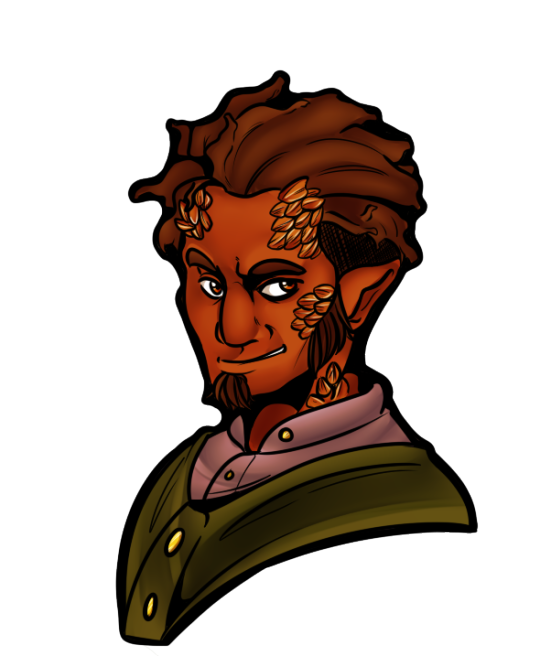
(Art by @biasanduntrue)
#Dungeons and Dragons#Original Characters#Canon#Aviva Lux#Epilogue#Title: The Flashbulb#Half-Elf#Draconic
3 notes
·
View notes
Text
Yo if anyone redding this knows Summoners Network (and their fairy tail dnd) the second-to-last one is Wilhelm Grimm in a nutshell.
Terrible Character Ideas:
A monk based on a European Christian archetype. They have sworn a sacred oath to defeat the giant snail plaguing the countryside.
A dragonborn desperately trying to convince the party that they’re really an aarakocra with a skin condition that made their feathers fall out.
Your standard horny bard, but they play a washboard.
A sentient hat piloting a mannequin.
A dark elf who’s afraid of the dark, and terrified of spiders.
A peasant farmer who joined the adventure because they’re going through a midlife crisis and want to ~find themself.~
A druid who got involved because they’re the party’s weed dealer.
A werewolf who doesn’t believe in the moon.
112K notes
·
View notes
Text
MISTER KINGSLEY
________________________________________________________________
Some time ago I wrote about the short cases Sherlock investigates at the beginning of TST (Spinning the plates). As it turned out each case seems to be closely connected to Sherlock himself in one way or another. It appears to be the same with characters who have a tattoo. Even as unlikely ones as the torturer in Serbia (TEH) or the unconscious ex-con in CAMs office (HLV)
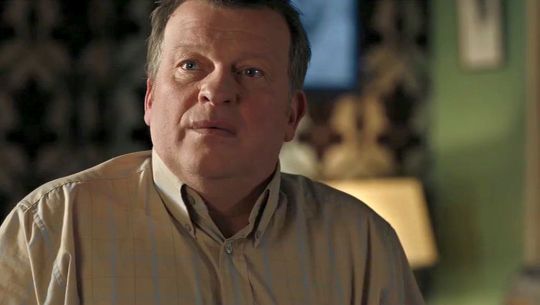
In TST a man comes to Baker Street and seeks the help of Sherlock Holmes. His wife left him and he assumes she was having an affair. Sherlock doesn't take that case but throwes the man out instead. This case might have been too boring for Sherlock but the man - Mr. Kingsley - is quite interesting. He has an almost faded tattoo on his forearm. Reason enough to take a closer look at this guy. Could he be a Sherlock mirror as well?
More under the cut .....
His name is KINGSLEY
Which includes the word KING. While Mycroft is compared to the 'queen' in ASIB, Sherlock is more than once connected to the 'king'.

'Am I the current king of England?' asks Sherlock in TSOT.
Elvis is called the 'King' as well and in THOB his face overlays Sherlock's while the first accords of 'Hound Dog' can be heard.
In TLD Elvis is mentioned again as a person who can be recognized by one name alone ... like Sherlock.
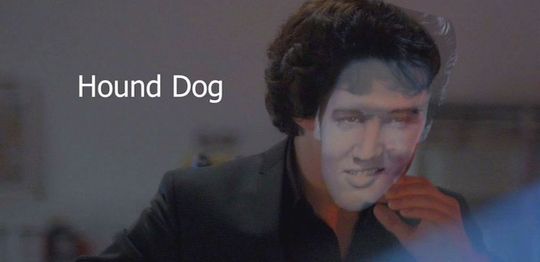
Now, you haven’t always been in life insurance, have you?
This is the very first information about Mr. Kingsley. He works in 'life insurance' .... is it too far a stretch connecting 'life insurance' to a form of protection ... of guarding? Sherlock himself (and some of his mirrors) are several times presented as 'guardians'.

You started out in manual labour. Oh, don’t bother being astonished. Your right hand’s almost an entire size bigger than your left. (“10½” over the right hand and “9½” over the other.) Hard manual work does that.
KINGSLEY: I was a carpenter, uh, like me dad.
A carpenter who is the son of a carpenter?. Is this another Christ reference? Wouldn't be the first time Sherlock is associated with Christ in this story.
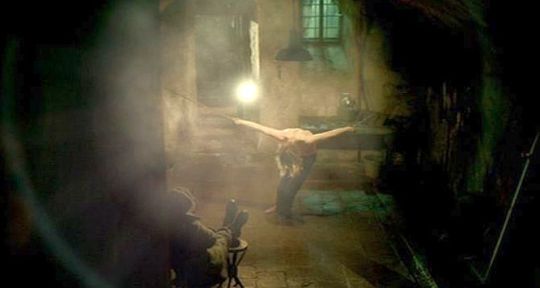
In the New Testament, Jesus is commonly referred to as "Jesus of Nazareth" (e.g., Mark 10:47). Jesus' neighbors in Nazareth refer to him as "the carpenter, the son of Mary and brother of James and Joses and Judas and Simon" (Mark 6:3), "the carpenter's son" (Matthew 13:55), or "Joseph's son" (Luke 4:22).
And you’re trying to give up smoking, unsuccessfully,
SHERLOCK: Not just e-cigarettes – ten individual e-cigarettes. Now, if you just wanted to smoke indoors, you would have invested in one of those irritating electronic pipe things, but you’re convinced you can give up, so you don’t want to buy a pipe because that means you’re not serious about quitting, so instead you buy individual cigarettes, always sure that each will be your last.
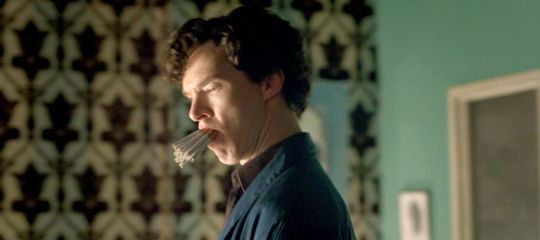
This speaks for itself, I think. :))))
You once had a Japanese girlfriend that meant a lot to you
But now you feel indifferent about. You’ve got a Japanese tattoo in the crook of your elbow in the name ‘Akako.’ It’s obvious you’ve tried to have it removed. KINGSLEY: But surely that means I wanna forget her, not that I’m indifferent. SHERLOCK: If she’d really hurt your feelings, you would have had the word obliterated, but the first attempt wasn’t successful and you haven’t tried again, so it seems you can live with the slightly blurred memory of Akako, hence the indifference.

This topic - the 'broken off realationships' of various kinds (parents, friends, lovers) - runs throughout the whole story. Stillborn children, orphans, lost siblings, children, friends, a dog and romances ending before they even had a chance to properly begin.
And of course the connection to Japan is another reference to the East, the Eastwind, Eurus and memory.

KINGSLEY: Sorry. I-I thought you’d done something clever. No, no. Ah, but now you’ve explained it, it’s dead simple, innit?
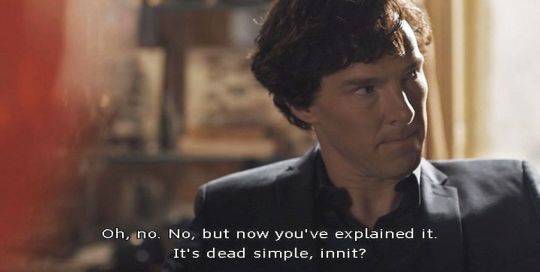
The whole deduction scene up unto this point is taken - with little changes - from ACDs Story 'The Red-Headed League'. In the original the client's name is Mr. Jabez Wilson. He is a former ship's carapenter who had once travelled to China. Holmes deduces this by a very distinctive fish tattoo on his arm and a coin on the watch chain. Mr. Wilson comes to Baker Street because the company he worked for suddenly 'vanished' without a trace. Turns out the whole organisation was a fake from the start. It's existance had been only created to lure Mr. Wilson away from his house for several hours per day to dig a secret tunnel to a nearby bank ... and the considerable fortune of French gold in its vaults.
The meaning of names
An interesting thing to notice is, that the name chosen for the lady in pink in ASIP is ... Jennifer Wilson. The name Wilson is also related to 'William', which is Sherlock's first name in this story.
William comes ultimately from the given name Wilhelm (cf. Old German Wilhelm and Old Norse Vilhjálmr). That is a compound of two distinct elements :
wil = "will or desire";
helm = Old English helm "helmet, protection"
Protector of desires - what a fitting name for Sherlock in this special adaptation!
Original Sherlock Holmes reacts to Mr. Wilson's rather simplifying interpretation, regarding the explanation of the deductions, quite different.
“I begin to think, Watson,” said Holmes, “that I make a mistake in explaining. ‘Omne ignotum pro magnifico,’ you know, and my poor little reputation, such as it is, will suffer shipwreck if I am so candid."
Omne ignotum pro magnifico .... 'every unknown thing is taken for great'
Or 'everything becomes commonplace by explanation' that's how Dr.Watson translates this statement in the lovely Granada adaptation of the 'Red-Headed League' with Jeremy Brett and David Burke (here).
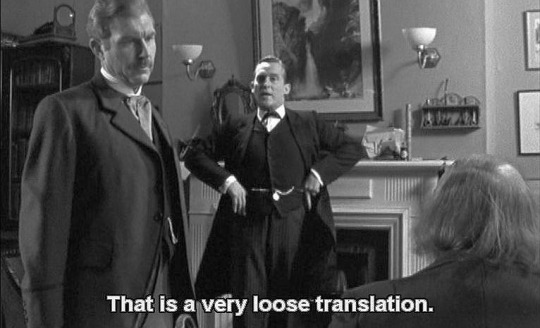
Back to Sherlock and Mr. Kingsley
Highly indignant and offended by Mr. Kingsley's dismissive reaction to his explanations, Sherlock launches from nil to a hundred into a real torrent of deductions about poor Mr. Kingsley, who listens dumbfounded.
I’ve withheld this information from you until now ...
... but I think it’s time you knew the truth. Have you ever wondered if your wife was a little bit out of your league? You thought she was having an affair. I’m afraid it’s far worse than that. Your wife is a spy. Her real name is Greta Bengtsdotter. Swedish by birth and probably the most dangerous spy in the world.
WATSON: You’re working for Mycroft? MRS WATSON: He likes to keep an eye on his mad sibling. HOLMES: And he had a spy to hand. Has it never occurred to you that your wife is excessively skilled for a nurse?
A 'super-agent' with a terrifying skill set? Oh, Mary I hear your tapping.

She’s been operating deep undercover for the past four years now as your wife for one reason only: to get near the American embassy which is across the road from your flat.
And once again the mention of an embasy - an ambassador. First Rufus Bruhl the US ambassador and his children Max and Claudette. Then the ambassador in Tiblisi who knew the truth about AMO. Three ambassadors in one story? A bit much for just coincidence, I think.
Tomorrow the US president will be at the embassy as part of an official state visit. As the president greets members of staff, Greta Bengtsdotter, disguised as a twenty-two stone cleaner, will inject the president in the back of the neck with a dangerous new drug hidden inside a secret compartment inside her padded armpit.
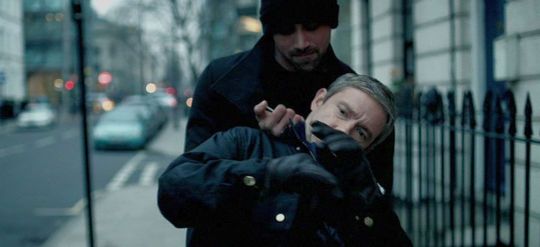
Like poor John in TEH? Before he got dumped under the bonfire woodpile? Is John the president?
This drug will then render the president entirely susceptible to the will of their new master, none other than James Moriarty.
Ahhhh .... another dangerous drug. H.O.U.N.D. is for creating fear. TD12 is to create the bliss of ignorance. And now something to gain full domination over someone else. Fear - loss of memory - loss of power .... how frightening.
Moriarty will then use the president as a pawn to destabilise the United Nations General Assembly which is due to vote on a nuclear non-proliferation treaty, tipping the balance in favour of a first strike policy against Russia. This chain of events will then prove unstoppable, thus precipitating ... World War Three.

This sounds a lot like '... Nuclear codes – I could blow up NATO in alphabetical order. In a world of locked rooms, the man with the key is king; and honey, you should see me in a crown.' Jim Moriarty ... ruler of the whole world!
JOHN: Are you serious? SHERLOCK: No, of course not.
'... his wife left him because his breath stinks and he likes to wear her lingerie.'
KINGSLEY: I don’t! Just the bras.
Really? Cross dressing like unle Rudi? Like Mycroft as Lady Bracknell? Oh, what a coincidence! Sometimes the universe seems to be rather lazy. :)))))
'his breath stinks' ... the simplest translation would be 'not liking what comes out of someones mouth' and I guess there are a lot of people who are convinced this applies perfectly to some of Sherlock's deductions.
SEBASTIAN: He could look at you and tell you your whole life story. Put the wind up everybody. We hated him.
Assuming Mr. Kingsley is indeed a mirror for Sherlock - created in his own mind - how heartbreakingly sad is this last deduction! Sherlock imagining a life partner who leaves him because of what comes out of his mouth ... and because of what he likes.
JOHN: So. What’s this all about, then? SHERLOCK: Having fun. ..... While I can.
In a nutshell ... Sherlock is annoyed and wants to have fun while he still can and because of that he invents an impromptu story - far-fetched and dramatically charged - about a most dangerous 'super agent' employed by a criminal mastermind to gain world domination. Sounds familiar ....
Are these kind of stories the ones Sherlock loves most?
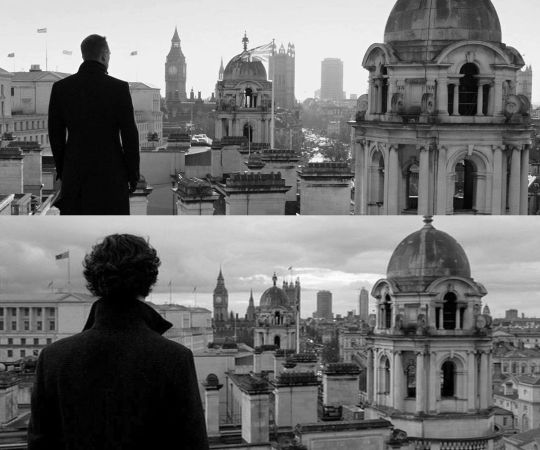
Stories about undercover agents, secret spies, super agents ... like Mr. 'double-0-seven' James Bond? Then he would propably get along very well with another character in this story. A little boy ... with a mop of unruly, curly, dark hair. For he seems to have quite similar interests as Sherlock .... and he is a clever boy as well .... Max Bruhl.
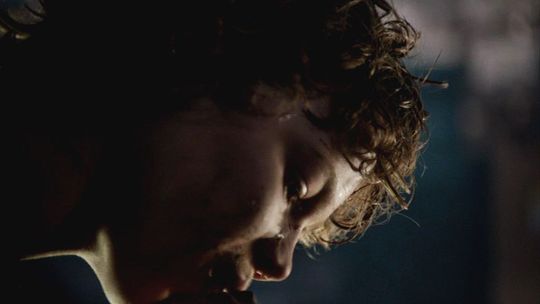
SHERLOCK: What would he do in the precious few seconds before they came into the room? How would he use them if not to cry out? This little boy; this particular little boy ... who reads all of those spy books. What would he do? JOHN: He’d leave a sign?
The ambassadors son .... Max Bruhl .... abducted and poisoned and left to die together with his sister Claudette.
This reminds me very much of Sherlock - who gets abducted and drugged as well ..... or poisoned?
September, 2017
I leave you too your own deductions Thanks @callie-ariane for the scripts.
@gosherlocked @loveismyrevolution @sagestreet @sherlockshadow @monikakrasnorada @kateis-cakeis @sarahthecoat @raggedyblue @darlingtonsubstitution @tjlcisthenewsexy
46 notes
·
View notes
Text
Can Technology Replace Economists?

If you've ever heard the words 'technology and economics', you may have jumped up and left the room, just thinking about how technology can replace economists? But before you go that far, let me explain what I mean. In a nutshell, what I'm saying is that we need to start rethinking our own economic models for use in explaining technological change. Because at the end of the day, no matter how sophisticated our technology, it's still just a simple thing that gives us more information. We can't know the future and be certain that the economy will continue to run on the way it has been doing so far. The same goes for economics. Sure, new things can change things but they don't give us knowledge about what will happen in the future, because all they can do is provide us with more information. It doesn't give us any kind of 'forecast' or forecast at all. So while we continue to use a relatively simple and well tested economic model to explain the world of today, the next few decades may not be predictable in terms of economics and technology. New technologies are likely to have greater effects on the economy and society than we ever thought possible, giving us a new paradigm and altogether different set of problems to solve, as they will have a greater impact than we could have ever imagined before. Now this raises the question, is the current economic system still fit for purpose? We may be at a turning point when the economic system will become obsolete and will not be able to do its job anymore. As technology becomes more advanced, it will change our whole lives and society. If this is the case, will we still be able to use a technological system to predict the future and explain our society and the way it works? Will technology replace economists? I think not. If this was to happen and technology replaced economics, then a lot of things would change. There would be an overall lack of information and predictability for everything that happens. Everything would be dependent on the whims of science and technology and not the natural laws of the world. Although, the same may not be true of the economic system, because although the information, analysis and predictions made by economists may change, their economic model can keep changing with the changes that technology causes. And if the predictions of economists become increasingly wrong, then it won't be wise to rely on them too much. Things would shift again and the entire system would come apart at the seams. Technology, for all its changes and innovations, remains something that is independent of nature and very dependent on humans, in many ways. That's why economists still have a place in predicting the future. They are still uniquely qualified and able to make predictions about how the world will change, what will happen and what will be the consequences. Although, this might mean that the knowledge and opinions of economists will start to fade. But for the time being, it is the best tool we have, and that's why we use it. So now, would it really be smart to go away from the economists altogether and use something else, such as the laws of thermodynamics? It would seem that thermodynamics, which has its roots in the early 1900s, is one of the better alternatives that we have to use to explain the world of today. But is it really more efficient than economists, in terms of explaining the future? I doubt it, because there is little doubt that people like Georg Wilhelm Friedrich Bernoulli and Thomas Young have done more to explain and predict the future than anyone else, not even including those who wrote about it. What it really comes down to is that whatever we use to explain and predict the future, it's basically all using the same thing, which is still a simple framework that shows us more information, but doesn't tell us anything about the future itself. and it's one of the biggest problems that our society faces, namely what to do about the future.
Will Technology Replace Economists?

Will Technology Replace Economists? Yes, it is quite possible. I remember the frustration when people used to ask me, "Will Economics Fall Out of the Sky?" It is too easy, and people need to be aware of this. However, there is no reason why we cannot make a rapid transition to technology - and a smarter future for the world. Perhaps you will not like this answer but, well, if you think about it, it would be hard to find a better answer. I don't like to get involved in politics, I am not an economist, I don't write these articles, and I do not know much about the subject matter. So, let's keep that in mind. Let's look at people from the past who didn't have all the modern conveniences - and for most people, they seem to have been happy. Even today, in the developed world, when some people have more than others, that doesn't seem to be cause for worry. When you think about it, it makes sense. You see, in the Industrial Revolution, things changed dramatically. Things were far more efficient and were starting to change the nature of work. The pace of life was changing and the change could be very good for the human race, as long as it happened slowly and in an orderly fashion. In other words, not all of this technology should have been rushed into existence. Instead, there needs to be a lot of introspection and a debate about the direction of the future, how things will change and where they will head. Then, and only then, should the changes start to be made. That's how it has been for centuries. It seems that some scientists and futurists think that scientists are still doing experiments on everyday people, in laboratories in the world of science fiction. It seems to me that is highly unlikely to happen in the real world any time soon. Let's face it, science fiction is a very long way away from what is likely to happen in the real world, I hope. We are entering a period where some people are working with technology that is far more advanced than anything that was ever imagined in our history. If we do not leave the way that we came from, that won't be the end of mankind. For sure, there will be some backlash against this development. But, what is much more important, is to ask yourself how you are going to respond to these changes and how you will integrate it into your lives. How you are going to adapt to this faster, smarter future? How will you be able to adapt and deal with those changes? Many people are unsure about how they are going to handle the changes and that is, of course, why there is some backlash in the real world. But, remember, these changes are here, and we must change or we will be forgotten species - history will not remember us as a species. There are some issues that should be discussed and others that will take a little bit longer to get to an appropriate place. We can only hope that we are able to understand these changes and they help us to adapt, when they come. Read the full article
#ai#artificalintelligence#CanTechnologyReplace#deeplearning#geeks#geeksarticles#geeksfromfuture#innovation#iot#machinelearning#robots#Technology#TechnologyForEconomists
0 notes
Text
The Dialectics of Dating

From the Stanford Encyclopaedia of Philosophy:
“Dialectics” is a term used to describe a method of philosophical argument that involves some sort of contradictory process between opposing sides” (Maybee 1)
Dialectics are a way of forming an argument or an explanation as a kind of debate. For instance, in Plato’s ‘socratic dialogues’, characters would have a discussion around a central topic which was framed as a debate in which one person would pose an argument with supporting point, and those sitting around the table would poke holes in the first’s argument. This is also known as the “Socratic Method”: a kind of argument framed around rooting out everything we know to be illogical by using facts, evidence, and logic to come to the most logical and evidence based conclusion.
The modern thinker who revamped Plato’s dialectical method was everybody’s favorite 18th-19th century German philosopher, Georg Wilhelm Friedrich Hegel. Hegel was in fact following the work of another German philosopher named Johann Gottlieb Fichte (Maybee 17).
Fichte’s work was ubiquitous in German Philosophy and would, like much of the intellectual work of his contemporaries, would later be used as a fraudulent basis for antisemetic thinking and an intellectual basis for the third Reich (Albada 38).
In a nutshell, the idea goes like this:

As we can see from the graphic, you start with an idea, then its opposite, and from there you create a synthesis: you take the best parts of both ideas and combine them.
So what does this have to do with dating?
Well let’s start by looking at the romantic life a typical American in the 1800s. Most men in Virginia started courting young ladies in their teens, and by the time they had completed an education and earned a stable income they proposed to a suitable young lady who could raise the children and run a household while the husband earned an income (Courtship 1). Much of this arrangement was a form of bondage, in which the wife had little to no say over her life or her own affairs, and her husband had pretty much all the power. Only once the “Married Women’s Property Act” of 1848 was passed did women have some semblance of self determination. Prior to this, women in many western cultures were considered another form of chattel: the same as a slave or livestock (Maurer 1).
Women fought hard for their rights through the 19th and 20th centuries, and even now in the 21st century their rights are constantly being threatened. You could say that this statement is simply partisan puffery, but it is a literal statement of fact. Even in 2019 nine states have passed laws restricting access to a woman’s right to abortion almost 50 years after Roe V. Wade (Gordon, Hurt 2).
But even in this short history of courtship, from the mid 19th century to 2019, we can see a trail leading from the closely monitored and standardized forms of courtship which turned into the myriad of confused and tenuous “dating” (read: hookup) apps in the current digitized social landscape.
There is a clear trail from the hegelian ‘thesis’ of old courtship and marriage proposals which read more like a contract, slowly giving way to the less and less formal forms of dating where strict parental supervision no longer was the norm by the early 1900s (History of Dating 2) . The term ‘dating’ was first popularized in a 1914 issue of The Ladies Home Journal, which was at the time one of the authorities on American propriety. We see here the ‘antithesis’ to the dating of old: a style where young people were no longer under the thumb of their parents and families at large, now given a very high degree of autonomy, relative to their former roles as mainly supplicants, even for the men.
From this antithesis, there was a synthesis in the 1950s. World War II and its mass casualties on the American side, there became less of a stress on dating ‘up’ and more of a focus on dating for love (History 2). But the problem with this less restrictive social standard is that it lead to increased divorse rates. Full disclosure, now we’re getting into what’s purely my opinion, but that’s what you’re really here for, or at least that’s what I’m assuming. When you can just pick up a new partner, there’s less incentive to stay in the marriage. And work things out.
However, there’s some evidence that the reverse is true. One study argues that compared to young newlyweds in 2008, married couples in 2016 were 18% less likely to get divorced (Luscombe 2). The financial incentives for all those young newlyweds to get hitched might actually be a trap. The data actually shows that, as is a common theme with many millenials, all the ‘incentives’ for newlyweds are more likely tied to people who already started out with advantages in life, and that for people looking to get married as a kind of legal-financial glue to help two people prop each other up, might not actually work out that way. 2018 census data shows that marriage is really just a way to stabilize the income and shelter taxes for those who are already doing well, and less of a financial incentive for the shrinking middle class and ever expanding lower class (Luscombe).
And then there’s hookup culture, which is surprisingly shrinking amongst a generation who’s more anxious than any other generation, and twice as anxious about work as any other generation (Gander 1). All generations are more anxious than in the past, according to a 2018 survey by the American Psychological Association, but Millennials share more of that anxiety than any other generational cohort. Millenials are so anxious it’s disrupting them in the workplace at twice the national average (MacLellan 2). Although the data says that this reported anxiety might just be that: more well reported in Millenials and Gen Z, and actually just as high in other generations: we just don’t know (MacLellan).
But You’ll notice a common theme in all this talk of our sputtering, out of control decline in dating and romantic culture. The economy. Yes, the economy has been bad in previous times (like the crash of 1929 and proceeding great depression) but even in the wake of that crash, we weren’t as isolated and cellebate. Personally, I blame a combination of technology and a kind of social fracturing whereby each person is taught to be their own ship. No longer do we value our community or family, and now every person is an island unto themselves. But the problem with that type of isolation is that it leaves people with no social or political way out. Sure, you can vote and make a difference on a political level, but I don’t really see any obvious solution to the problem. It’s much easier than ever just to stop contacting someone even if you don’t want to go through the hassle of breaking up, and you were probably never anything that ‘serious’ to begin with.
Works Cited
Albada, Michael. “Fichte or fascist? The misappropriation of a republican philosopher in Weimar, Germany 1918-1933”. Stanford.edu. Stanford Undergraduate Research Journal, 2012. P.1, web.stanford.edu/group/journal/cgi-bin/wordpress/wp-content/uploads/2012/09/Albada_Hum_2012.pdf. Accessed Sept. 30, 2019
Gander, Kashmira. “Millenials Are The Most Anxious Generation, New Research Shows”. Newsweek.com. Newsweek, 2019. www.newsweek.com/millennials-most-anxious-generation-new-research-shows-917095. Accessed Sept. 30, 2019.
Gordon, Mara. “Early Abortion Bans: Which States Have Passed Them?”. NPR.org. National Public Radio, 5, Jun. 2019. www.npr.org/sections/health-shots/2019/06/05/729753903/early-abortion-bans-which-states-have-passed-them. Accessed Sept. 30, 2019.
“The History of Dating in America”. Sexinfo.Online. University of California, Santa Barbara, 23, Mar. 2019. sexinfo.soc.ucsb.edu/article/history-dating-america. Accessed Sept. 30, 2019.
Luscombe, Belinda. “The Divorce Rate Is Dropping. That May Not Actually Be Good News.”. Time.com. Time USA, LLC., 26, Nov., 2018. time.com/5434949/divorce-rate-children-marriage-benefits/. Accessed Sept. 30, 2019.
MacLellan, Lila. “Millennials experience work-disrupting anxiety at twice the US average rate”. Quartz at Work. Newsweek, 5 Dec. 2018. www.newsweek.com/millennials-most-anxious-generation-new-research-shows-917095. Accessed Sept. 30, 2019.
Maurer, Elizabeth. “Courtship and Marriage in the Eighteenth Century”. History.org. The Colonial Williamsburg Foundation, 2019. www.history.org/history/teaching/enewsletter/volume7/mar09/courtship.cfm. Accessed Sept. 30, 2019.
#hegel#hegelian dialectic#dating#philosophy#thinkpiece#writers on tumblr#instagram#writersofinstagram#long reads#read
0 notes
Note
About the relic knowledge, i still don't understand why Seiros spared the Elite's families. They most likely knew how to make relics?
Well,
Rhea goes Gandalf to prevent a second “Red Canyon”, so I suppose in the WoH she wasn’t really on-board with eradicating Elite lines because they were born or just because they have that knowledge (contrary to Macuil? and maybe Wilhelm?).
OTOH, Seiros post WoH apparently recovered the Relics, but later on she gave them back to their families. Did she have a breakdown when she saw Loog mounting his rebellion with other relic-looking weapons (provided by Pan the secret Mole man) and went “okay, I’ll give them the ones I have so they won’t have to kill anyone else (what if they find sleeping!Cethleann?) to get weapons” ?
which raises the question what were Pan’s weapons? Relics made from real Nabateans or phony ones like the zombified!Dudes have in VW’s finale?
We don’t know what happened to the priest who was on the verge of discovering 1+1 =2 in the abyss, but dude stopped his researches not because the Archbishop was pointing a sword at his neck, but because he feared “the Goddess would not approve”. Which, in a way, would fit with Rhea’s very soft power approach, she doesn’t want to use weapons to prevent knowledge from being discovered, but will make people understand and believe they should not pry too much.
just like the incident with cersei dealing with a certain song in ASOIAF, it spells an uncomfortable truth so she has the singer arrested/Qyburn’d - her brother points out that going that far to silence a guy only gives more credit to his slenders/words
There’s always the “what if it doesn’t work” angle to work with. If the Priest shared his findings with whoever was in charge of the Western Church or Ionius 5 of Adrestia? What would happen?
In a nutshell : Rhea’s been walking on eggshells since the end of the WoH for 1000 years, trying to protect herself but also not wanting to eradicate people for what they know and/or who they were born to. And while it fails, because the Empire, her allies, have been infiltrated by Mole people, her gambit works regarding the Elites’s descendants, who always side with her.
The war doesn’t start because Felix wants a new sword and wishes to carve Flayn in a new one, it starts because Mole People support Edelgard who, apparently, doesn’t think Dragons should interact with Humans.
Too bad Rhea is relegated to a glorified infodump at the end of a route, or doesn’t exist in the other, because I’d really have loved a dialogue between Rhea and Dimitri/Claude.
Cucumber point though : how the fuck GM’s random smith knows how to repair relics???
#anon#replies#FE16#maybe the game didn't think about it too much#but iirc more than half of the Dudes' heirs can support a nabatean let it be flayn or seteth#Felix can support two lizards#maybe a point can be made regarding how#rhea favoured more the dude's descendants than willy's ones#maybe she thought willy and his scions don't need to be favoured because they'll never buy the agarthan propaganda#it failed#also counterpoint with the western church#when i say side with her it's more in the lines of try to look for her and don't give her to zombified dude in Claude's route#willy being 'let's kill everyone who might know' with macuil agreeing in the bg is my new hc
0 notes